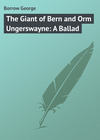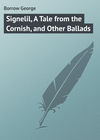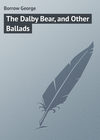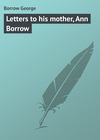Loe raamatut: «Wild Wales: The People, Language, & Scenery», lehekülg 32
CHAPTER LXXI
Wild Moors – The Guide – Scientific Discourse – The Land of Arthur – The Umbrella – Arrival at Bala.
When I had rested myself and finished the buttermilk I got up, and, making the good woman a small compensation for her civility, inquired if I could get to Bala without returning to Llan Rhyadr.
“O yes,” said she, “if you cross the hills for about five miles you will find yourself upon a road which will take you straight to Bala.”
“Is there any one here,” said I, “who will guide me over the hills provided I pay him for his trouble?”
“O yes,” said she; “I know one who will be happy to guide you whether you pay him or not.”
She went out and presently returned with a man about thirty-five, stout and well-looking, and dressed in a waggoner’s frock.
“There,” said she, “this is the man to show you over the hills; few know the paths better.”
I thanked her, and telling the man I was ready, bade him lead the way. We set out, the two dogs of which I have spoken attending us and seemingly very glad to go. We ascended the side of the hog-backed hill to the north of the Rhyadr. We were about twenty minutes in getting to the top, close to which stood a stone or piece of rock, very much resembling a church altar, and about the size of one. We were now on an extensive moory elevation, having the brook which forms the Rhyadr a little way on our left. We went nearly due west, following no path, for path there was none, but keeping near the brook. Sometimes we crossed watercourses which emptied their tribute into the brook, and every now and then ascended and descended hillocks covered with gorse and whin. After a little time I entered into conversation with my guide. He had not a word of English. “Are you married?” said I.
“In truth I am, sir.”
“What family have you?”
“I have a daughter.”
“Where do you live?”
“At the house of the Rhyadr.”
“I suppose you live there as servant?”
“No, sir, I live there as master.”
“Is the good woman I saw there your wife?”
“In truth, sir, she is.”
“And the young girl I saw your daughter?”
“Yes, sir, she is my daughter.”
“And how came the good woman not to tell me you were her husband?”
“I suppose, sir, you did not ask who I was, and she thought you did not care to know.”
“But can you be spared from home?”
“O yes, sir, I was not wanted at home.”
“What business are you?”
“I am a farmer, sir.”
“A sheep farmer?”
“Yes sir.”
“Who is your landlord?”
“Sir Watkin.”
“Well, it was very kind of you to come with me.”
“Not at all, sir; I was glad to come with you, for we are very lonesome at Rhyadr, except during a few weeks in the summer, when the gentry come to see the Pistyll. Moreover, I have sheep lying about here which need to be looked at now and then, and by coming hither with you I shall have an opportunity of seeing them.”
We frequently passed sheep feeding together in small numbers. In two or three instances my guide singled out individuals, caught them, and placing their heads between his knees examined the inside of their eyelids, in order to learn by their colour whether or not they were infected with the pwd or moor disorder. We had some discourse about that malady. At last he asked me if there was a remedy for it.
“O yes,” said I; “a decoction of hoarhound.”
“What is hoarhound?” said he.
“Llwyd y Cwn,” said I. “Pour some of that down the sheep’s throat twice a day, by means of a horn, and the sheep will recover, for the bitterness, do you see, will destroy the worm 10 in the liver, which learned men say is the cause of the disorder.”
We left the brook on our left hand and passed by some ruined walls which my guide informed me had once belonged to houses but were now used as sheep-folds. After walking several miles, according to my computation, we began to ascend a considerable elevation covered with brown heath and ling. As we went on the dogs frequently put up a bird of a black colour, which flew away with a sharp whirr.
“What bird is that?” said I.
“Ceiliog y grug, the cock of the heath,” replied my guide. “It is said to be very good eating, but I have never tasted it. The ceiliog y grug is not food for the like of me. It goes to feed the rich Saxons in Caer Ludd.”
We reached the top of the elevation.
“Yonder,” said my guide, pointing to a white bare place a great way off to the west, “is Bala road.”
“Then I will not trouble you to go any further,” said I; “I can find my way thither.”
“No, you could not,” said my guide; “if you were to make straight for that place you would perhaps fall down a steep, or sink into a peat hole up to your middle, or lose your way and never find the road, for you would soon lose sight of that place. Follow me, and I will lead you into a part of the road more to the left, and then you can find your way easily enough to that bare place, and from thence to Bala.” Thereupon he moved in a southerly direction down the steep and I followed him. In about twenty minutes we came to the road.
“Now,” said my guide, “you are on the road; bear to the right and you cannot miss the way to Bala.”
“How far is it to Bala?” said I.
“About twelve miles,” he replied.
I gave him a trifle, asking at the same time if it was sufficient. “Too much by one half,” he replied; “many, many thanks.” He then shook me by the hand, and accompanied by his dogs departed, not back over the moor, but in a southerly direction down the road.
Wending my course to the north, I came to the white bare spot which I had seen from the moor, and which was in fact the top of a considerable elevation over which the road passed. Here I turned and looked at the hills I had come across. There they stood, darkly blue, a rain cloud, like ink, hanging over their summits. O, the wild hills of Wales, the land of old renown and of wonder, the land of Arthur and Merlin.
The road now lay nearly due west. Rain came on, but it was at my back, so I expanded my umbrella, flung it over my shoulder and laughed. O, how a man laughs who has a good umbrella when he has the rain at his back, aye and over his head too, and at all times when it rains except when the rain is in his face, when the umbrella is not of much service. O, what a good friend to a man is an umbrella in rain time, and likewise at many other times. What need he fear if a wild bull or a ferocious dog attacks him, provided he has a good umbrella? he unfurls the umbrella in the face of the bull or dog, and the brute turns round quite scared, and runs away. Or if a footpad asks him for his money, what need he care provided he has an umbrella? he threatens to dodge the ferrule into the ruffian’s eye, and the fellow starts back and says, “Lord, sir! I meant no harm. I never saw you before in all my life. I merely meant a little fun.” Moreover, who doubts that you are a respectable character provided you have an umbrella? you go into a public-house and call for a pot of beer, and the publican puts it down before you with one hand without holding out the other for the money, for he sees that you have an umbrella and consequently property. And what respectable man, when you overtake him on the way and speak to him, will refuse to hold conversation with you, provided you have an umbrella? No one. The respectable man sees you have an umbrella and concludes that you do not intend to rob him, and with justice, for robbers never carry umbrellas. O, a tent, a shield, a lance and a voucher for character is an umbrella. Amongst the very best friends of man must be reckoned an umbrella. 11
The way lay over dreary, moory hills: at last it began to descend and I saw a valley below me with a narrow river running through it to which wooded hills sloped down; far to the west were blue mountains. The scene was beautiful but melancholy; the rain had passed away, but a gloomy almost November sky was above, and the mists of night were coming down apace.
I crossed a bridge at the bottom of the valley and presently saw a road branching to the right. I paused, but after a little time went straight forward. Gloomy woods were on each side of me and night had come down. Fear came upon me that I was not in the right road, but I saw no house at which I could inquire, nor did I see a single individual for miles of whom I could ask. At last I heard the sound of hatchets in a dingle on my right, and catching a glimpse of a gate at the head of a path, which led down into it, I got over it. After descending some time I hallooed. The noise of the hatchets ceased. I hallooed again, and a voice cried in Welsh, “What do you want?” “To know the way to Bala,” I replied. There was no answer, but presently I heard steps, and the figure of a man drew nigh half undistinguishable in the darkness and saluted me. I returned his salutation, and told him I wanted to know the way to Bala. He told me, and I found I had been going right. I thanked him and regained the road. I sped onward and in about half an hour saw some houses, then a bridge, then a lake on my left, which I recognised as the lake of Bala. I skirted the end of it, and came to a street cheerfully lighted up, and in a minute more was in the White Lion Inn.
CHAPTER LXXII
Cheerful Fire – Immense Man – Doctor Jones – Recognition – A Fast Young Man – Excellent Remarks – Disappointment.
I was conducted into the coffee-room of the White Lion by a little freckled maid whom I saw at the bar, and whom I told that I was come to pass the night at the inn. The room presented an agreeable contrast to the gloomy, desolate places through which I had lately come. A good fire blazed in the grate, and there were four lights on the table. Lolling in a chair by one side of the fire was an individual at the sight of whom I almost started. He was an immense man, weighing I should say at least eighteen stone, with brown hair, thinnish whiskers, half-ruddy, half-tallowy complexion, and dressed in a brown sporting coat, drab breeches and yellow-topped boots – in every respect the exact image of the Wolverhampton gent or hog-merchant who had appeared to me in my dream at Llangollen, whilst asleep before the fire. Yes, the very counterpart of the same gent looked this enormous fellow, save and except that he did not appear to be more than seven or eight and twenty, whereas the hog-merchant looked at least fifty. Laying my satchel down I took a seat and ordered the maid to get some dinner for me, and then asked what had become of the waiter Tom Jenkins.
“He is not here at present, sir,” said the freckled maid; “he is at his own house.”
“And why is he not here?” said I.
“Because he is not wanted, sir; he only comes in summer when the house is full of people.”
And having said this the little freckled damsel left the room.
“Reither a cool night, sir!” said the enormous man after we had been alone together a few minutes.
I again almost started, for he spoke with the same kind of half-piping, half-wheezing voice, with which methought the Wolverhampton gent had spoken to me in my dream.
“Yes,” said I; “it is rather cold out abroad, but I don’t care, as I am not going any farther to-night.”
“That’s not my case,” said the stout man, “I have got to go ten miles, as far as Cerrig Drudion, from which place I came this afternoon in a wehicle.”
“Do you reside at Cerrig Drudion?” said I.
“No,” said the stout man, whose dialect I shall not attempt further to imitate, “but I have been staying there some time; for happening to go there a month or two ago I was tempted to take up my quarters at the inn. A very nice inn it is, and the landlady a very agreeable woman, and her daughters very agreeable young ladies.”
“Is this the first time you have been at Bala?”
“Yes, the first time. I had heard a good deal about it, and wished to see it. So to-day, having the offer of a vehicle at a cheap rate I came over with two or three other gents, amongst whom is Doctor Jones.”
“Dear me,” said I; “is Doctor Jones in Bala?”
“Yes,” said the stout man; “do you know him?”
“Oh yes,” said I, “and have a great respect for him; his like for politeness and general learning is scarcely to be found in Britain.”
“Only think,” said the stout man. “Well, I never heard that of him before.”
Wishing to see my sleeping room before I got my dinner, I now rose and was making for the door, when it opened, and in came Doctor Jones. He had a muffler round his neck, and walked rather slowly and disconsolately, leaning upon a cane. He passed without appearing to recognise me, and I, thinking it would be as well to defer claiming acquaintance with him till I had put myself a little to rights, went out without saying anything to him. I was shown by the freckled maid to a nice sleeping apartment, where I stayed some time adjusting myself. On my return to the coffee-room I found the doctor sitting near the fire-place. The stout man had left the room. I had no doubt that he told Doctor Jones that I had claimed acquaintance with him, and that the doctor not having recollected me had denied that he knew anything of me, for I observed that he looked at me very suspiciously.
I took my former seat, and after a minute’s silence said to Doctor Jones, “I think, sir, I had the pleasure of seeing you some time ago at Cerrig Drudion?”
“It’s possible, sir,” said Doctor Jones in a tone of considerable hauteur, and tossing his head so that the end of his chin was above his comforter, “but I have no recollection of it.”
I held my head down for a little time, then raising it and likewise my forefinger I looked Doctor Jones full in the face and said, “Don’t you remember talking to me about Owen Pugh and Coll Gwynfa?”
“Yes, I do,” said Doctor Jones in a very low voice, like that of a person who deliberates; “yes, I do. I remember you perfectly, sir,” he added almost immediately in a tone of some animation; “you are the gentleman with whom I had a very interesting conversation one evening last summer in the bar of the inn at Cerrig Drudion. I regretted very much that our conversation was rather brief, but I was called away to attend to a case, a professional case, sir, of some delicacy, and I have since particularly regretted that I was unable to return that night, as it would have given me much pleasure to have been present at a dialogue which, I have been told by my friend the landlady, you held with a certain Italian who was staying at the house, which was highly agreeable and instructive to herself and her daughter.”
“Well,” said I, “I am rejoiced that fate has brought us together again. How have you been in health since I had the pleasure of seeing you?”
“Rather indifferent, sir, rather indifferent. I have of late been afflicted with several ailments the original cause of which, I believe, was a residence of several years in the Ynysoedd y Gorllewin – the West-India Islands – where I had the honour of serving her present gracious Majesty’s gracious uncle, George the Fourth – in a medical capacity, sir. I have likewise been afflicted with lowness of spirits, sir. It was this same lowness of spirits which induced me to accept an invitation made by the individual lately in the room to accompany him in a vehicle with some other people to Bala. I shall always consider my coming as a fortunate circumstance inasmuch as it has given me an opportunity of renewing my acquaintance with you.”
“Pray,” said I, “may I take the liberty of asking who that individual is?”
“Why,” said Doctor Jones, “he is what they call a Wolverhampton gent.”
“A Wolverhampton gent,” said I to myself; “only think!”
“Were you pleased to make any observation, sir?” said the doctor.
“I was merely saying something to myself,” said I. “And in what line of business may he be? I suppose in the hog line.”
“O no,” said Doctor Jones. “His father it is true is a hog-merchant, but as for himself he follows no business; he is what is called a fast young man, and goes about here and there on the spree, as I think they term it, drawing, whenever he wants money, upon his father, who is in affluent circumstances. Some time ago he came to Cerrig Drudion, and was so much pleased with the place, the landlady and her daughters that he has made it his head-quarters ever since. Being frequently at the house I formed an acquaintance with him, and have occasionally made one in his parties and excursions, though I can’t say I derive much pleasure from his conversation, for he is a person of little or no literature.”
“The son of a hog-merchant,” thought I to myself. “Depend upon it, that immense fellow whom I saw in my dream purchase the big hog at Llangollen fair, and who wanted me to give him a poond for his bargain, was this gent’s father. O there is much more in dreams than is generally dreamt of by philosophy!”
Doctor Jones presently began to talk of Welsh literature, and we were busily engaged in discussing the subject when in walked the fast young man, causing the floor to quake beneath his ponderous tread. He looked rather surprised at seeing the doctor and me conversing, but Doctor Jones turning to him said, “O I remember this gentleman perfectly.”
“Oh!” said the fast young man; “very good!” then flinging himself down in a chair with a force that nearly broke it and fixing his eyes upon me said, “I think I remember the gentleman too. If I am not much mistaken, sir, you are one of our principal engineers at Wolverhampton. O yes! I remember you now perfectly. The last time I saw you was at a public dinner given to you at Wolverhampton, and there you made a speech, and a capital speech it was.”
Just as I was about to reply Doctor Jones commenced speaking Welsh, resuming the discourse on Welsh literature. Before, however, he had uttered a dozen words he was interrupted by the Wolverhampton gent, who exclaimed in a blubbering tone: “O Lord, you are surely not going to speak Welsh. If I had thought I was to be bothered with Welsh I wouldn’t have asked you to come.”
“If I spoke Welsh, sir,” said the Doctor, “it was out of compliment to this gentleman, who is a proficient in the ancient language of my country. As, however, you dislike Welsh, I shall carry on the conversation with him in English, though peradventure you may not be more edified by it in that language than if it were held in Welsh.”
He then proceeded to make some very excellent remarks on the history of the Gwedir family, written by Sir John Wynn; to which the Wolverhampton gent listened with open mouth and staring eyes. My dinner now made its appearance, brought in by the little freckled maid – the cloth had been laid during my absence from the room. I had just begun to handle my knife and fork, Doctor Jones still continuing his observations on the history of the Gwedir family, when I heard a carriage drive up to the inn, and almost immediately after two or three young fellows rollicked into the room. “Come, let’s be off,” said one of them to the Wolverhampton gent; “the carriage is ready.” “I’m glad of it,” said the fast young man, “for it’s rather slow work here. Come, doctor! are you going with us or do you intend to stay here all night?” Thereupon the doctor got up, and coming towards me, leaning on his cane, said: “Sir! it gives me infinite pleasure that I have met a second time a gentleman of so much literature. That we shall ever meet a third time I may wish but can scarcely hope, owing to certain ailments under which I suffer, brought on, sir, by a residence of many years in the Occidental Indies. However, at all events I wish you health and happiness.” He then shook me gently by the hand and departed with the Wolverhampton gent and his companions; the gent as he stumped out of the room saying, “Good night, sir; I hope it will not be long before I see you at another public dinner at Wolverhampton, and hear another speech from you as good as the last.” In a minute or two I heard them drive off.
Left to myself I began to discuss my dinner. Of the dinner I had nothing to complain, but the ale which accompanied it was very bad. This was the more mortifying, for remembering the excellent ale I had drunk at Bala some months previously I had, as I came along the gloomy roads the present evening, been promising myself a delicious treat on my arrival.
“This is very bad ale!” said I to the freckled maid, “very different from what I drank in the summer, when I was waited on by Tom Jenkins.”
“It is the same ale, sir,” said the maid, “but the last in the cask; and we shan’t have any more for six months, when he will come again to brew for the summer; but we have very good porter, sir, and first-rate Allsopp.”
“Allsopp’s ale,” said I, “will do for July and August, but scarcely for the end of October. However, bring me a pint; I prefer it at all times to porter.”
My dinner concluded, I trifled away the time till about ten o’clock, and then went to bed.




















